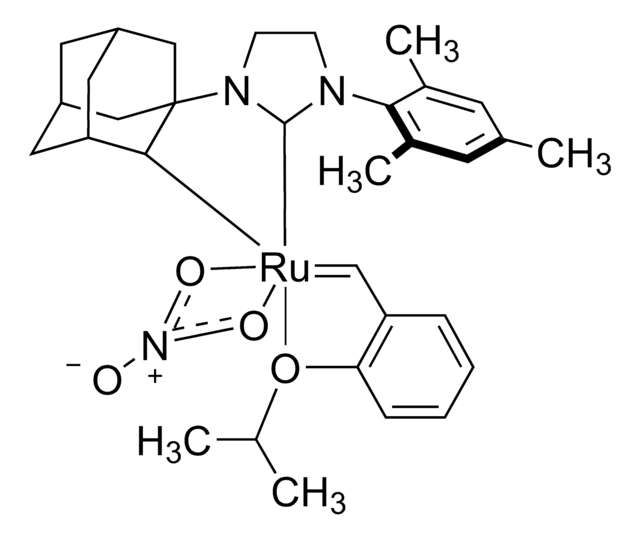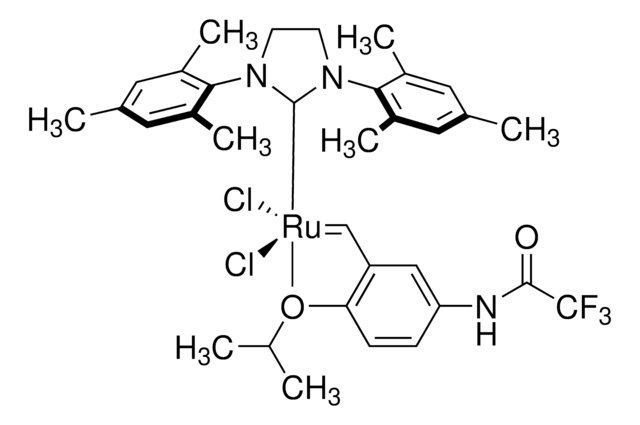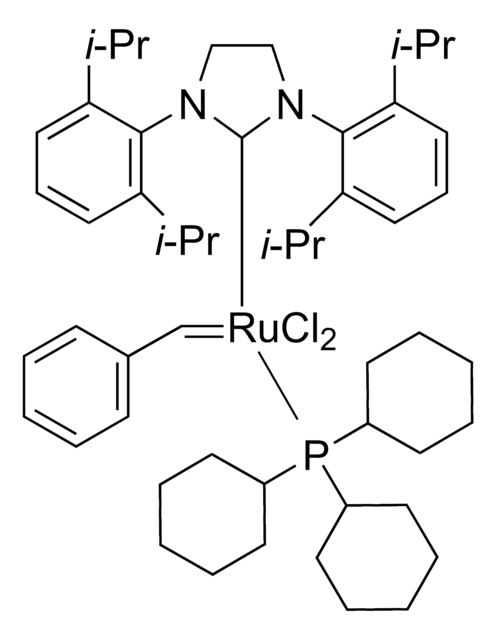577944
Hoveyda-Grubbs Catalyst® M700
Umicore
Synonym(s):
Hoveyda-Grubbs Catalyst® 1st Generation, Hoveyda-Grubbs Catalyst® M70 (C601), Dichloro(2-isopropoxyphenylmethylene) (tricyclohexylphosphine)ruthenium(II), Dichloro(o-isopropoxyphenylmethylene)(tricyclohexylphosphine)ruthenium(II)
About This Item
Recommended Products
Quality Level
form
solid
reaction suitability
core: ruthenium
reagent type: catalyst
reaction type: Ring Opening Metathesis Polymerisation
mp
195-197 °C (lit.)
storage temp.
2-8°C
SMILES string
[H]\C(c1ccccc1OC(C)C)=[Ru](\Cl)Cl.C2CCC(CC2)P(C3CCCCC3)C4CCCCC4
InChI
1S/C18H33P.C10H12O.2ClH.Ru/c1-4-10-16(11-5-1)19(17-12-6-2-7-13-17)18-14-8-3-9-15-18;1-8(2)11-10-7-5-4-6-9(10)3;;;/h16-18H,1-15H2;3-8H,1-2H3;2*1H;/q;;;;+2/p-2
InChI key
KMKCJXPECJFQPQ-UHFFFAOYSA-L
Application
Learn more about our metathesis catalysts
Legal Information
related product
Signal Word
Warning
Hazard Statements
Precautionary Statements
Hazard Classifications
Flam. Sol. 2
Storage Class Code
4.1B - Flammable solid hazardous materials
WGK
WGK 3
Flash Point(F)
Not applicable
Flash Point(C)
Not applicable
Personal Protective Equipment
Certificates of Analysis (COA)
Search for Certificates of Analysis (COA) by entering the products Lot/Batch Number. Lot and Batch Numbers can be found on a product’s label following the words ‘Lot’ or ‘Batch’.
Already Own This Product?
Find documentation for the products that you have recently purchased in the Document Library.
Customers Also Viewed
Related Content
Research in the Grubbs group has centered on the development and application of a suite of highly active, selective, and bench stable ruthenium alkylidene complexes capable of catalyzing versatile olefin metatheses.
Our team of scientists has experience in all areas of research including Life Science, Material Science, Chemical Synthesis, Chromatography, Analytical and many others.
Contact Technical Service










![Dichloro[1,3-bis(2,4,6-trimethylphenyl)-2-imidazolidinylidene][[5-[(dimethylamino)sulfonyl]-2-(1-methylethoxy-O)phenyl]methylene-C]ruthenium(II)](/deepweb/assets/sigmaaldrich/product/structures/179/573/f48a2a1e-cf09-4151-8b78-2bab614efd5c/640/f48a2a1e-cf09-4151-8b78-2bab614efd5c.png)


